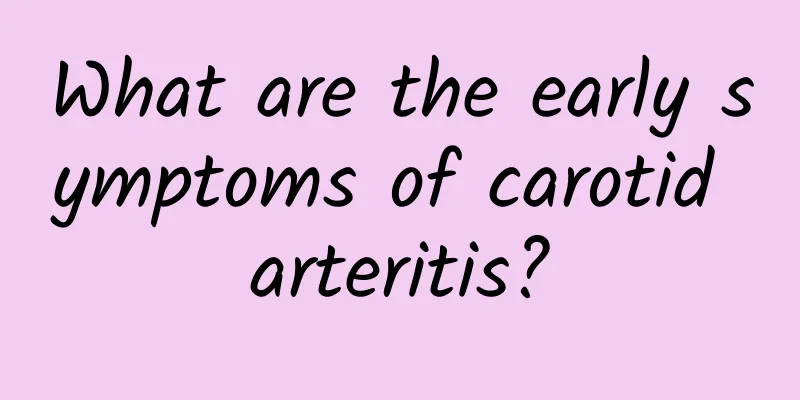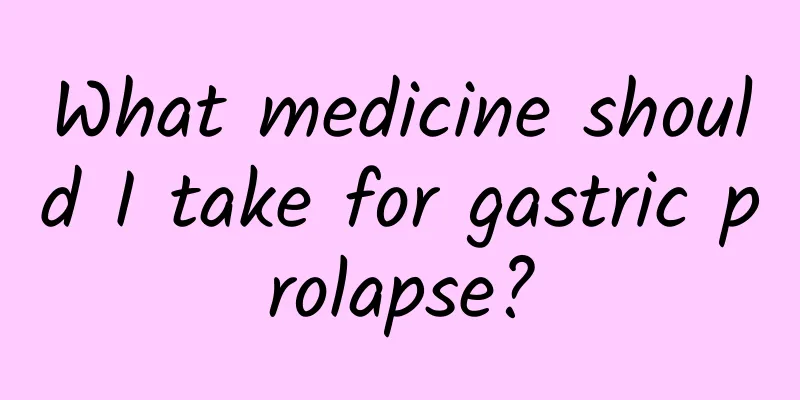What are the early symptoms of carotid arteritis?

|
Carotid arteritis is also known as carotid periarteritis. It is usually manifested as pain or tenderness in the neck artery. It often occurs in the throat, face, ears, shoulders and other organs of the human body. The incidence rate is generally highest in women. Carotid arteritis is very harmful to the human body. If we suffer from carotid arteritis, we must seek treatment as soon as possible to avoid delaying the disease and missing the best time for treatment. What are the early symptoms of carotid arteritis? Symptoms of Carotid Arteritis: ① Throbbing pain, distending pain or stabbing pain in the neck and throat, which is usually on one side or heavier on one side. The pain is aggravated when swallowing saliva, but not so painful when eating (called "empty throat pain"). The pain is also aggravated when turning the neck or lowering the head. ② Foreign body sensation in the throat, or accompanied by pain in the ear on the same side, forehead and occipital scalp pain, and shoulder and back pain; ③Some patients have low fever below 38°C, and systemic symptoms are less common. What are the symptoms of carotid stenosis? Common symptoms: tinnitus, dizziness, blackouts, foggy vision, hard skin on the back of the neck and shoulders, visual impairment, inability to turn the neck, narrow murmurs, demyelinating lesions of the cervical spinal cord, sore neck and back pain in postpartum women, headaches, diffuse severe pain in the neck and back when waking up in the morning Carotid artery stenosis caused by atherosclerosis is more common in middle-aged and elderly people and is often accompanied by multiple cardiovascular risk factors. Carotid artery stenosis caused by brachiocephalic arteritis is more common in adolescents, especially young women. Carotid artery stenosis caused by injury or radiation, with a history of corresponding injury or radiation exposure before the onset of the disease. Clinically, carotid artery stenosis is divided into two categories: symptomatic and asymptomatic, depending on whether it produces symptoms of cerebral ischemia. 1. Symptomatic carotid artery stenosis (1) Symptoms of cerebral ischemia may include tinnitus, vertigo, blackouts, blurred vision, dizziness, headache, insomnia, memory loss, drowsiness, and nightmares. Symptoms of ocular ischemia include decreased vision, hemianopsia, diplopia, etc. (2) The transient loss of local neurological function in TIA is clinically manifested as temporary disturbance of sensory or motor function in one limb, transient monocular blindness or aphasia, etc., which usually only lasts for a few minutes and fully recovers within 24 hours after onset. Imaging examination showed no focal lesions. (3) Common clinical symptoms of ischemic stroke include sensory disturbance of one limb, hemiplegia, aphasia, cranial nerve damage, and coma in severe cases, with corresponding neurological signs and imaging features. 2. Asymptomatic carotid artery stenosis Many patients with carotid artery stenosis do not have any neurological symptoms or signs clinically. Sometimes, only during physical examination is it discovered that the carotid artery pulse is weakened or absent, and vascular bruits are heard at the base of the neck or along the course of the carotid artery. Asymptomatic carotid artery stenosis, especially severe stenosis or plaque ulcer, is recognized as a "high-risk lesion" and is receiving increasing attention. |
<<: What would happen if you did it three times a day?
>>: What does active gastritis mean?
Recommend
Are tampons useful?
Are tampons easy to use? Many female friends will...
Baby born with black mole on leg
Moles are a skin condition that we are all famili...
Causes of chest tightness, palpitations and shortness of breath
Sometimes we experience symptoms of chest tightne...
What to do if you have skin allergies
Skin diseases are very common diseases. They are ...
What to do if the flesh around the teeth is swollen
The flesh next to the teeth is also the gums. Red...
Differentiation between neonatal acne and eczema
Neonatal acne is a skin disease related to body h...
What is the cause of the foreskin crack?
The glans is the male reproductive organ, and the...
What causes women's skin to turn yellow? What are the causes?
Many people don’t often get sun exposure, but the...
What causes back pain? Four major causes of back pain
Cervical spondylosis, neck sprain and stiff neck,...
Learn about cupping and its five benefits
I believe everyone has heard of cupping. It is a ...
15-year-old girl has a lump in her chest and slight pain
A 15-year-old girl has a lump in her breast and s...
Luffa seeds treat kidney deficiency
As people's lifestyles continue to change, va...
What causes bitter mouth?
I believe many of my friends have had this or sim...
What disease can snake skin cure?
Since ancient times, shed snake skins have been u...
The difference between blood in stool and hemorrhoids
Constipation and hemorrhoids are two completely d...









